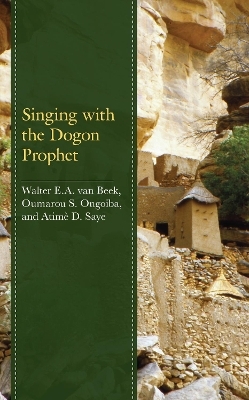
Singing with the Dogon Prophet
Seiten
2022
Lexington Books (Verlag)
978-1-7936-5425-0 (ISBN)
Lexington Books (Verlag)
978-1-7936-5425-0 (ISBN)
As one of their great figures, the Dogon of Mali honor Abirɛ, a singer and prophet from the nineteenth century who composed the principal mourning songs. This book examines how these prophecies and songs form a poignant expression of ethnic Dogon philosophy.
In the Dogon funeral proceedings, a major song cycle called baja ni is performed in a session of at least seven hours. The texts of the chants are attributed to a legendary figure called Abirɛ, who as a blind singer in the nineteenth century roamed the heartland of the Dogon. The baja ni songs have escaped scholarly attention thus far. Singing with the Dogon Prophet by Walter E.A. van Beek, Oumarou S. Ongoiba, and Atimε D. Saye provides their first publication in English as well as an analysis of these songs. These texts deal with the relations between man and woman, man’s ambivalent dependency on the otherworld, and with life and death; the whole night performance is one of the high points of the funeral. Additionally, Abirɛ is a prophet, and during his life has uttered a great number of prophecies on a wide range of topics, from local issues to the relation of the Dogon with the Fulbe herdsmen, and from the arrival of the colonials to ecological transformation. This book examines how these prophecies with these songs offer an inside view of the way the Dogon construct the present in a continuous dialogue with their past and their projected future.
In the Dogon funeral proceedings, a major song cycle called baja ni is performed in a session of at least seven hours. The texts of the chants are attributed to a legendary figure called Abirɛ, who as a blind singer in the nineteenth century roamed the heartland of the Dogon. The baja ni songs have escaped scholarly attention thus far. Singing with the Dogon Prophet by Walter E.A. van Beek, Oumarou S. Ongoiba, and Atimε D. Saye provides their first publication in English as well as an analysis of these songs. These texts deal with the relations between man and woman, man’s ambivalent dependency on the otherworld, and with life and death; the whole night performance is one of the high points of the funeral. Additionally, Abirɛ is a prophet, and during his life has uttered a great number of prophecies on a wide range of topics, from local issues to the relation of the Dogon with the Fulbe herdsmen, and from the arrival of the colonials to ecological transformation. This book examines how these prophecies with these songs offer an inside view of the way the Dogon construct the present in a continuous dialogue with their past and their projected future.
Walter E.A. van Beek is emeritus professor of anthropology at Tilburg University and senior researcher at the African Studies Centre Leiden. Oumarou S. Ongoiba is professor of French for the Toronto District School Board. Atimè D. Saye is a translator of Dogon and French, and head of an extended family in Tireli, Mali.
List of Figures
Preface
Acknowledgements
Chapter 1: Singing through the night
Chapter 2: A Dogon heritage
Chapter 3: The blind singer
Chapter 4: The baja ni in Dogon culture
Chapter 5: The songs
Chapter 6: Prophecies
Appendix 1: The singers
Appendix 2: Villages with information on Abirε
Appendix 3: List of Jamsay and Toro so terms
Bibliography
| Erscheinungsdatum | 21.04.2022 |
|---|---|
| Zusatzinfo | 1 BW Illustrations, 36 BW Photos, 3 Tables |
| Verlagsort | Lanham, MD |
| Sprache | englisch |
| Maße | 160 x 229 mm |
| Gewicht | 526 g |
| Themenwelt | Kunst / Musik / Theater ► Musik ► Musiktheorie / Musiklehre |
| Sozialwissenschaften ► Ethnologie | |
| Sozialwissenschaften ► Soziologie | |
| ISBN-10 | 1-7936-5425-5 / 1793654255 |
| ISBN-13 | 978-1-7936-5425-0 / 9781793654250 |
| Zustand | Neuware |
| Informationen gemäß Produktsicherheitsverordnung (GPSR) | |
| Haben Sie eine Frage zum Produkt? |
Mehr entdecken
aus dem Bereich
aus dem Bereich
Grundbegriffe, Harmonik, Formen, Instrumente
Buch | Softcover (2021)
Philipp Reclam (Verlag)
CHF 12,90
kreative Lösungen, nachhaltige Praktiken und inspirierende …
Buch | Softcover (2024)
oekom verlag
CHF 49,95


